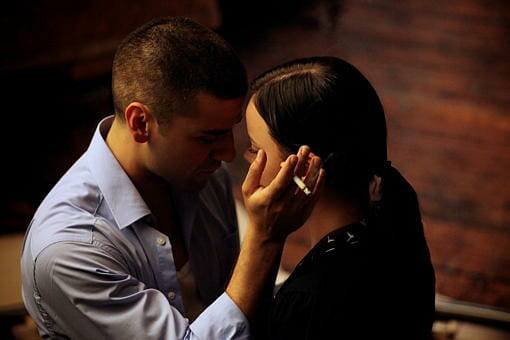By Meredith Alloway · December 12, 2011

I’ll just say it straight: this movie was pretty awful, and its obsession with being pretty is exactly what makes it awful. We all know Madonna, who co-wrote and directed the film, has an affinity for sex and being sexy, but those trademark talents should have stayed far away from this story. She intertwines the life of a lonely, lost housewife Wally (Abbie Cornish) with the romance of King Edward VIII (James D’Arcy) and American divorcée Wallis Simpson (Andrea Riseborough). The film is nearly choked by its focus on the beautiful parties, jewels and costumes that occupy each character’s world and when Wally steps out in another form of lingerie, we think, “What the *&% is this film about?”
This is the part of the review where you explain the plot without giving away the twists and turns. I’m tempted to skip this “section” because that would imply that W.E. actually has a plot. Nevertheless, with no plot and no big spoiler secrets or surprises to preserve, W.E. attempts to be a story about a woman’s journey to find happiness.
We meet Wally at a gala honoring her successful physiatrist husband, who everyone tells her she’s lucky to have. But his true side is revealed when he consistently works late hours, spending his little time at home nursing a scotch and refusing to have sex with Wally. She wants a baby, he doesn’t. She’s lonely; he doesn’t seem to care. She finds refuge in an art exhibit showcasing the possessions of King Edward VIII and his wife Wallis. Visiting the museum daily, and for long hours, she catches the attention of one of the security guards Evgeni (Oscar Isaac).
The film jumps back and forth from Wally’s story in Manhattan to Wallis’ in England. Her relationship with Edward blossoms, and she soon faces the struggle of maintaining their initial romance and avoiding the lifestyle that comes with being royalty’s biggest scandal. She has no privacy and fears she’s “the most hated woman in England.” The film attempts to mirror her struggle for joy with Wally’s, both women searching for a happily-ever-after ending with their prince charming.
In an interview with Gus Van Sant for Interview magazine, Madonna freely admits that the concept behind W.E. is "fantastic and a complicated piece; very much a labor of love.” She explains, "I've been writing it for the last two and a half years, to tell you the truth. It's been kind of an obsession of mine. I made 'Filth and Wisdom' because I realized that I didn't really have a right to make a bigger film until I made a smaller film — and learned how to make a film." Madonna, sorry to burst your bubble, but the quality of a film doesn’t lie in the spectrum of its length, but in its capacity for story.
And W.E. has none. Nothing actually happens and after the first forty-five minutes, you’re still waiting for some kind of inciting incident. It’s clear that Wally is in a bad relationship, one that she recognizes is so, but does nothing about. The flaw is in the script, which provides us with a main character that is ultimately a passive player. It may be true to life, plenty of housewives go unloved and unsatisfied, but for a protagonist, they need to be fighters. Cornish, poor thing, does the best she can with Wally, whose main mission is make sadness sexy, oh, and flaunt her perfect cheekbones.
Riseborough delivers an impressive performance as Wallis, jumping right out of the 30s with a peppy wit and sultry confidence. It’s too bad her story should have been completely cut. Madonna’s goal was to have Wally find faith in herself through Wallis’ story, which according to the end of the film, she does! How? Oh, it doesn’t show us that.
The film does find merit in its cinematography and artistic design. The costumes are breathtaking and actors never looking short of divine. But this divinity has no place in its scenes of abuse, heartbreak and hardship. Pearls should never fly through the air in delicate slow motion while a woman is being beaten. Never.
Because the film is so obsessed with being visually beautiful, it completely washes over any moment of true emotion or grit. We’re watching mannequins, instead of living, breathing, hurting people, which rob us of any opportunity for emotional attachment. No one looks that pretty in pain.